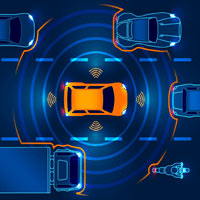Self-Driving Car Behaviors Consumers Prefer in Crash Situations
October 31, 2018 Earlier this year, an Uber Technologies, Inc. self-driving car was involved in the first pedestrian fatality associated with autonomous vehicle technology. This tragic accident brought attention to this emerging technology, and whether the vehicle should have detected the pedestrian sooner, so that the emergency braking system could have prevented the accident.
Earlier this year, an Uber Technologies, Inc. self-driving car was involved in the first pedestrian fatality associated with autonomous vehicle technology. This tragic accident brought attention to this emerging technology, and whether the vehicle should have detected the pedestrian sooner, so that the emergency braking system could have prevented the accident.
A new study published in “Risk Analysis: An International Journal” took a closer look at the self-driving car industry, and what the public considers to be the most morally and ethically preferred behavior by an autonomous vehicle in a potential crash situation.
Researchers asked study participants to choose between staying in their lane and hitting the brakes or swerving, each of which could result in an accident with another vehicle. Overall, researchers found that people tend to prefer the car to remain in its lane and come to an emergency stop, rather than swerve into another lane.
In addition, they discovered that people were less likely to move out of their lane, even if it resulted in an accident. These findings support the fact that participants consider the stay option a reasonable default when it comes to self-driving vehicles.
Experiments That Reflect Consumer Preference
Experiment 1: A total of 872 participants were presented with a written description of a traffic scenario, involving an autonomous vehicle that had to either stay in its lane, or swerve, in order to avoid two different traffic risks.
If the vehicle stayed in its lane, it could endanger a pedestrian who was in the street. Swerving could result in an accident involving a bystander on the sidewalk. Over 85 percent of the participants expressed a general preference to stay in the lane.
Even considering different “risk conditions,” participants considered staying in the lane more acceptable than swerving.
Experiment 2: This looked at people’s opinion of how autonomous vehicles performed when reviewing the details of an accident after it occurred. For this experiment, researchers recruited 766 participants. They were asked their opinion about how an autonomous vehicle should perform in a certain situation, and to examine the pros and cons of staying in the lane versus swerving.
Participants preferred that the vehicle stay in its lane, even when a car accident occurred.
Consumer Opinions
According to one of the lead researchers, the study shows how consumers feel about autonomous vehicles, and how they behave in varying degrees of uncertainty. However, policy makers must develop policies that are morally responsible, but which also protect the safety of the vehicle’s passengers.
The results of this study indicate that while the public generally accepts a default action to minimize potential losses, they ultimately prefer features that save the occupants of the vehicle.
Baltimore Car Accident Lawyers at LeViness, Tolzman & Hamilton Protect Victims of Self-Driving Vehicle Accidents
If you or someone you know have been seriously injured in a car accident involving a self-driving vehicle, contact the Baltimore car accident lawyers at LeViness, Tolzman & Hamilton at your earliest convenience. There is still a lot we do not know about autonomous vehicle technology, and the potential risks associated with it. Our legal team will protect your rights and determine who is responsible for causing the accident. We will seek the maximum financial compensation you deserve for your injuries. To schedule a free consultation, call us today at 800-547-4LAW (4529) or contact us online.
Our offices are located in Baltimore, Columbia, Glen Burnie, and Towson, allowing us to represent car accident victims in Maryland, including those in Anne Arundel County, Baltimore County, Carroll County, Harford County, Howard County, Montgomery County, Maryland’s Western Counties, Prince George’s County, Queen Anne’s County, Southern Maryland, and the Eastern Shore, as well as the communities of Catonsville, Essex, Halethorpe, Middle River, Rosedale, Gwynn Oak, Brooklandville, Dundalk, Pikesville, Nottingham, Windsor Mill, Lutherville, Timonium, Sparrows Point, Ridgewood, and Elkridge.






